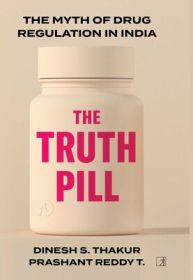 | |
| Authors |
|
|---|---|
| Language | English |
| Subjects | |
| Genre | Nonfiction |
| Publisher | Simon & Schuster India |
Publication date | 10 October 2022 |
| Publication place | India |
| Media type | Print (hardback), Digital |
| Pages | 508 |
| ISBN | 9789392099175 |
| Website | thetruthpill |
The Truth Pill: The Myth of Drug Regulation in India is a 2022 book by whistleblower Dinesh Thakur and lawyer Prashant Reddy. The book highlights the problems in India's drug regulatory framework, and the government oversight relating to poor manufacturing practices and clinical trials of drugs by Indian pharmaceutical companies. [1]
Contents
The authors advocate for greater transparency and reforms in India's drug regulation and enforcement system. [1]